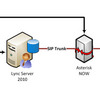 I have strong disagreements with a guest blog post on Skype Journal that was posted a few days ago titled "A SIP/Skype Gateway Is NOT In The Forecast". I totally disagree that a SIP/Skype gateway isn't in the forecast. I've blogged on a few occasions where I discussed the desire for Skype users to have SIP connectivity. First, let me include an excerpt where the guest blogger, Hudson Barton lays out his argument:
I have strong disagreements with a guest blog post on Skype Journal that was posted a few days ago titled "A SIP/Skype Gateway Is NOT In The Forecast". I totally disagree that a SIP/Skype gateway isn't in the forecast. I've blogged on a few occasions where I discussed the desire for Skype users to have SIP connectivity. First, let me include an excerpt where the guest blogger, Hudson Barton lays out his argument:Skype's competitors and critics continually point out that Skype's VOIP architecture is closed and that its API is not adequate for creating a direct connection between the Skype "cloud" and the SIP "cloud". This of course is true, but there are good reasons for it.
Hudson then provides a list of his reasons why a SIP-to-Skype gateway is isn't going to happen. Let's examine each one followed by my counterpoint:
- 1. The security and reliability of the Skype cloud would be seriously compromised if SIP hackers were given the tools to create direct VOIP connections between Skype and the outside world.
I showed Dan York, an expect on VoIP security a draft of this blog post to get his thoughts. Ironically, Dan told me he planned on writing up a post soon countering Hudson's argument as well. Dan also confirmed that he was a participant with Hudson and others in a strong debate in Phil Wolff's "Skype 3.x" public Skype groupchat about a recent relevant article he wrote
- 2. A SIP gateway to Skype might work if it were handled like SkypeIn/Out. However, I don't think there's a large enough population of SIP users out there to justify the cost of SIPIn/Out. Skype is growing at a rate of 500k-1000k "real users" per month, which is probably 10x faster than the rest of the VOIP world combined. A third party could build these gateways with the presently available API, but nobody is trying it to my knowledge... presumably because there is no demand for it. In any case, the developer (even if it were Skype) would have to justify the cost of such a gateway.
Counterargument: Not a large enough population of SIP users? You're kidding, right? There are millions of SIP-based phones out there from Avaya, Mitel, Polycom, Aastra, and more. Even mobile phones are bundling SIP clients, including the Nokia E60, E70, N80, N90, and more. SIP clients are much less processor-intensive than Skype clients, so SIP is more suitable to mobile phones. Further, even if the endpoint (desktop phone) isn't SIP, usually the IP-PBX is SIP-based and has a built-in SIP gateway. Wouldn't it be nice if you could simply assign a SIP trunk to a SkypeOut or SkypeIn account? Then when you dial from your desktop IP phone, the call is routed through your IP-PBX to SkypeIn/SkypeOut account at discounted rates. Considering Skype Pro offers unlimited calling plans in the U.S./Canada for $36/year and SkypeIn is $60/year, that's only $36+ $645 = $96/year for an inbound number plus unlimited inbound & outbound calling. SkypePro actually discounts the SkypeIn, so it actually works out to be less than that. A business that can get unlimited long-distance calls for less than $96/year per Skype account is an absolute bargain! Unlike a voice T1 where you have to pay for the full 24 channels of voice - even if you never use the full 24 channels, with Skype you can provision individual lines as you need them.
- 3. An IM (text-only) gateway is very possible and would not compromise Skype's security or strategic position. Look for future interconnections with major players like AIM, gTalk, Yahoo, and MSN.
4. The Skype cloud is far more complex and has far more features than the clouds of any of its competitors. It is not rational to expect any of them to create a feature-for-feature mirror of Skype even if this were something that would be good for Skype (which it is NOT). A partial list of these features: video, SMS, encryption, and file transfer.
5. Relationships between Skype and social networks like MySpace are already possible if there is a partnership agreement. It does not require a change to the Skype API. Note that MySpace is a social network... not a VOIP carrier.
Counterargument: Now I see the problem. Hudson Barton is looking at this from a very Internet-centric approach (video, IM, Myspace) and he's neglecting the most important aspect of Skype - namely the voice calling. While Skype is one of the most popular Internet communications applications, we need to stop thinking of Skype as a "next-generation" Internet communications application that will one day replace the PSTN. The PSTN isn't going anywhere anytime soon, which is why VoIP gateways are so popular; they bridge the IP and PSTN worlds. One day voice will ride 100% end-to-to-end over IP, but we need solutions today. Skype is a great solution, but it's an island onto itself (just like the PSTN), but at least you can bridge to the PSTN via gateways. With Skype, that isn't so easy. There are some workarounds to add SIP functionality to Skype, but nothing scalable or reliable enough to use in a business setting.
Yes, in the near future and even presently we are seeing cool Web 2.0/Voice 2.0 mashups with Skype and social networking sites. But aside from the coolness factor, what do people really use Skype for? Cheap/free voice calling, right? Right now I can "Skype" family, friends, coworkers, or a plethora of VoIP industry insiders and talk to them for free. But I have to put on my headset to do so. Why can't i simply pick up by SIP phone, use the LCD screen to dial one of my contacts and use my high-quality desktop speaker phone if I so choose? Many VoIP phones such as the Aastra line of phones include an XML browser that can be programmed to display Skype contacts, presence info, etc. to allow for quick keypress dialing. Unfortunately, the Aastra phones are SIP-based and not Skype, so you'd still need a SIP-to-Skype gateway somewhere on the network.
Conclusion:
Maybe I'm off my rocker for wanting Skype to be a viable business solution as an alternative to analog or T1 trunks. Then again, people are buying SIP trunks like hotcakes, so businesses are choosing IP (SIP) trunks instead of TDM trunks. Why is Skype neglecting this huge business revenue-generating opportunity to offer Skype IP trunks? Perhaps rumors of eBay looking to sell Skype tells us something - Skype has lost its edge. Feel free to tell me I don't know what I'm talking about in the comments.













